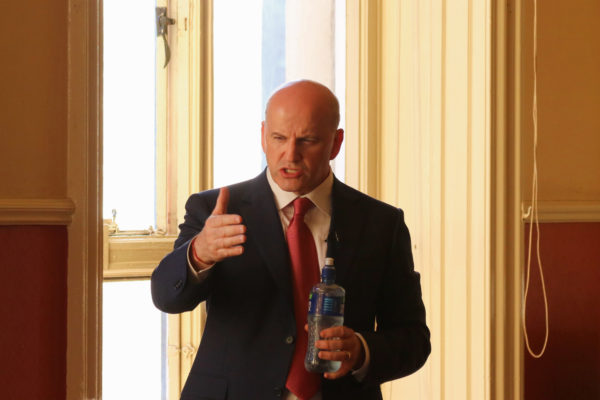
When Presidential nominee Sean Gallagher was addressed as “Mr Gallagher” at Trinity Politics Society’s event last night, he quickly corrected them. “Please, call me Sean”, he said. Thus began a talk that would be defined by its informality, as Gallagher strove to appeal to students with a pragmatic charm and an amicable, open nature.
Bookended by two sets of questions and answers – the first an impromptu socratic dialogue between Gallagher and particularly eager attendees, the second a series of detailed, if rambling, responses to audience questions – the presidential candidate, businessman and reality TV star gave a comprehensive run down of his campaign pledges, discussing, by turns, disability support, increasing volunteerism, protecting small and medium-sized enterprises and achieving a united Ireland.
The more cynical might consider these themes mere buzzwords, but Gallagher’s speech was, above all, pitched as a rebuke to those who find the presidential race more style than substance. “Do not let cynicism creep into you”, he expressly told those in attendance, “there’s a cynicism now, and a negativity out there, for all of us who step forward in public life”.
Indeed, while some of Gallagher’s more stylised turns of phrase had the shiny veneer you would expect from a TV personality – he described reunification, for example, as something that will come about “not because of legislation, because of imagination,” and ambitiously pitched himself as “a role model for anyone who has ever struggled” – it was hard to deny his conviction. Whether promising to make the role of President carbon neutral, or recalling fond memories of Northern Irish politician John Hume, Gallagher consistently brought an earnestness to proceedings that seemed more genuine than manufactured.
It was with this sense of authenticity that Gallagher engaged the audience in a discussion that was perhaps more philosophical than the hardcore politicos in attendance had bargained for. The importance of community, and the role of politics, business and economics can play in protecting it, came up again and again, and it was abstract concepts like this that defined Gallagher’s musings. At one stage, Gallagher responded to a question about the separation of church and state with an extended parable describing a visit to the gates of heaven, at another he used an extended metaphor about feeding wolves to discuss the importance of political participation.
If Gallagher was aiming for the metaphysical, the audience, a small but engaged crowd, were more than willing to take him to task on more practical issues of policy. Gallagher fielded questions on the sustainability of farming, Irish trade links with the US, and the economic position of multinational corporations from an audience that didn’t suffer fools gladly. Obscure terminology and up-to-date acronyms were thrown around from person to person, and salient issues were returned to again and again throughout. Gallagher’s points about reunification in particular seemed to catch the audience’s eye, with Gallagher receiving three separate questions about a United Ireland’s feasibility.
In these areas, Gallagher gave as good as he got, and was able to respond with solid outlines of the practical measure he would implement as president. It was here, however, that any attempts to be all things to all people fell down, as Gallagher took definite stances on a number of issues. While explaining the importance of developing more amicable relations with governments in the North, he described Arlene Foster as “the closest leader to where I live” before admitting that “in every other respect we’re far apart”.
This more grounded section of the talk also gave Gallagher an opportunity to expand on his much trumpeted belief in the importance of entrepreneurship, likely one of the most contentious angles of his campaign. “In many ways they’re despised as people who make too much money”, he said, defending the owners of medium-sized businesses who take pride of place in many of his campaign pledges: “Most of the entrepreneurs I know don’t make that much money, they make a living.”
If recent polling is anything to go by, Gallagher is unlikely to end up in the Áras by the close of this year, but this appeared to have little bearing on the strength of his self-belief. “The fact that you even turned up is great”, he said to the audience towards the talk’s conclusion, summing up a political attitude that could easily be applied to his campaign as a whole – it was participation, not victory, that seemed to define his outlook. And if tonight’s talk was anything other than a genuine bid to discuss politics with a group of well-informed, interested students, then Gallagher certainly did a good job of hiding it.






